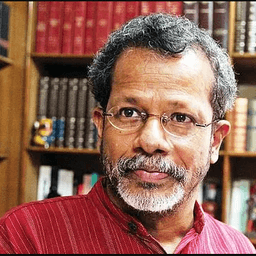Part 1
Interim government has not come to work on foreign policy

Professor Imtiaz Ahmed is a renowned expert on international relations in Bangladesh. Following the political upheaval and subsequent transitional government, Bangladesh faces a new reality in its foreign relations. This includes a fluctuating relationship with neighboring India, as well as the future of diplomatic ties with the United States and China. Professor Imtiaz Ahmed shared his insights with Views Bangladesh, interviewed by senior reporter Manik Miazee. Here is the first part of the two-part interview.
Views Bangladesh: Under the Yunus-led government, Bangladesh seems to have built strong relationships with the international community. How is Bangladesh benefitting from this?
Imtiaz Ahmed: When a new government assumes power, its primary objective is often reform. However, reform at the domestic level is more crucial than achievements on the international stage. This interim government was not formed to implement international reforms. Its main task is to expedite the election process as quickly as possible. Once that is clarified, the international community can adjust its approach accordingly, knowing whether to work with the interim government or wait for the elected one.
Views Bangladesh: In January, Donald Trump will assume the presidency of the United States. Could this pose any challenges for the interim government in Bangladesh?
Imtiaz Ahmed: It is well-known that the Democratic Party had a relatively open relationship with members of this interim government. However, whether such ties exist with the Republican Party remains unclear. With Trump taking office in January, it’s worth noting that the Republican Party has come to power with an unprecedented mandate, something not seen in the past 128 years. Therefore, establishing and strengthening relations with them is essential.
Views Bangladesh: Trump has tweeted about minority persecution in Bangladesh. Will his administration’s stance have any impact on the current government?
Imtiaz Ahmed: Historically, the Awami League had a good relationship with the Democratic Party, but not so much with the Republicans, particularly during 1971. This dynamic has evolved somewhat over time. However, Trump’s concerns about minority issues were raised during the tenure of the Awami League government. Take the case of Priya Saha’s allegations as an example. While previous governments blamed the BNP for such narratives, the current opposition blames the Awami League.
What matters now is that individuals within the government who understand diplomatic sensitivities and minority issues should be utilized effectively. Key figures in the upcoming Trump administration reportedly have close ties to India, and Republicans have historically been vocal about minority issues. Bangladesh’s strategy should involve skillful diplomacy to address these concerns.
Views Bangladesh: The attack on Bangladesh’s Tripura Deputy High Commission, sparked by false videos aired on Indian media, has strained Bangladesh-India relations. Could this further deteriorate ties?
Imtiaz Ahmed: When India’s media disseminated false and negative information about Bangladesh, the immediate response from Bangladesh should have been to summon the Indian High Commissioner for a discussion. Although this was eventually done, albeit after 4–5 days, it was a step in the right direction. It shows Bangladesh is reengaging diplomatically.
Diplomacy involves multiple approaches, and deciding which to use depends on the situation. It’s crucial to explore all diplomatic avenues to safeguard national interests.
Views Bangladesh: The incident is said to be a violation of the Vienna Convention. What measures can Bangladesh take?
Imtiaz Ahmed: There are three key aspects here:
1. It’s a direct violation of the Vienna Convention.
2. India has previously accused the UK and Canada of failing to protect its missions during attacks in those countries. India must now reflect on its own actions regarding the protection of foreign missions. Immediate summoning of their representatives might have facilitated quicker resolution.
3. Protests against foreign countries are common, but ensuring these protests do not endanger diplomatic missions is critical. India failed in this regard.
Views Bangladesh: Does the attack indicate that law enforcement in India’s northeastern states is failing?
Imtiaz Ahmed: While India has significant security forces deployed in the northeastern states, these forces are more experienced in handling conflict situations than safeguarding diplomatic missions. The lack of preparedness for such incidents in Tripura, unlike in Delhi or Kolkata, underscores this issue.
Views Bangladesh: Could attacks on foreign missions in India prompt countries like the US, Canada, or the UK to temporarily suspend their diplomatic activities?
Imtiaz Ahmed: This incident gives countries like the UK and Canada leverage over India. They can now counter India’s accusations of failing to protect their missions abroad by pointing out similar failures within India. However, unless such attacks directly target their missions, these countries are unlikely to escalate the matter further.
Views Bangladesh: India has cited security concerns to limit its High Commission’s activities in Bangladesh, while Mamata Banerjee has suggested deploying peacekeepers in Bangladesh. In response, a Bangladeshi advisor has mentioned deploying peacekeepers to India. Do such statements align with diplomatic norms?
Imtiaz Ahmed: Both remarks are political and inappropriate. Peacekeeping initiatives should come from the central government, not a regional leader like Mamata Banerjee. These statements often aim to grab media attention rather than resolve issues. In South Asia, political figures frequently overstep their responsibilities, which complicates matters for those entrusted with resolving them.
Views Bangladesh: Is Bangladesh gravitating towards China due to its strained relationship with India?
Imtiaz Ahmed: The interim government was not established to navigate foreign policy or align with any particular geopolitical bloc. Its mandate is limited and temporary. Any long-term foreign policy direction will be determined by the next elected government. Foreign nations are likely observing the political landscape in Bangladesh, awaiting the outcome of the elections to decide their future course of action.
(To be continued)
Also Read
Final episode
Setting up any country's base camp in Saint Martin is impossible



Leave A Comment
You need login first to leave a comment